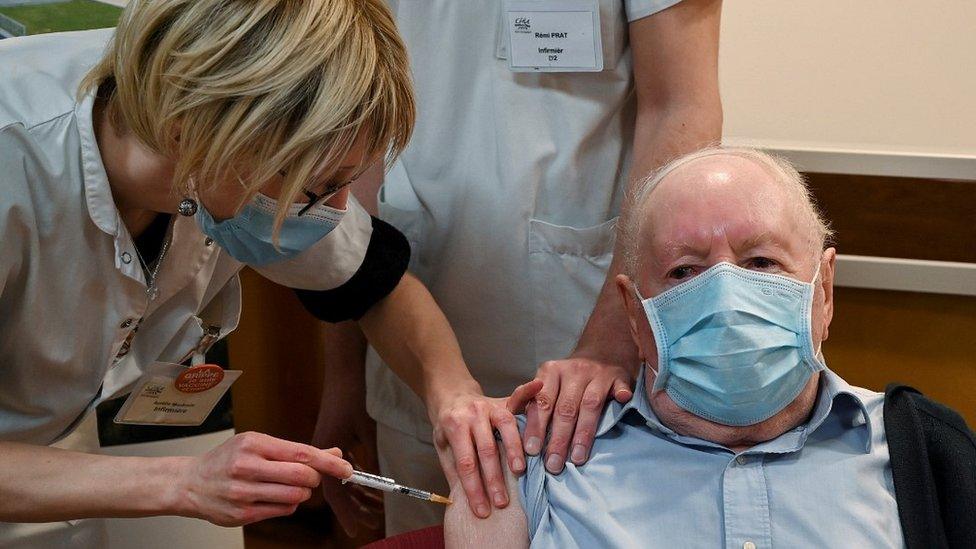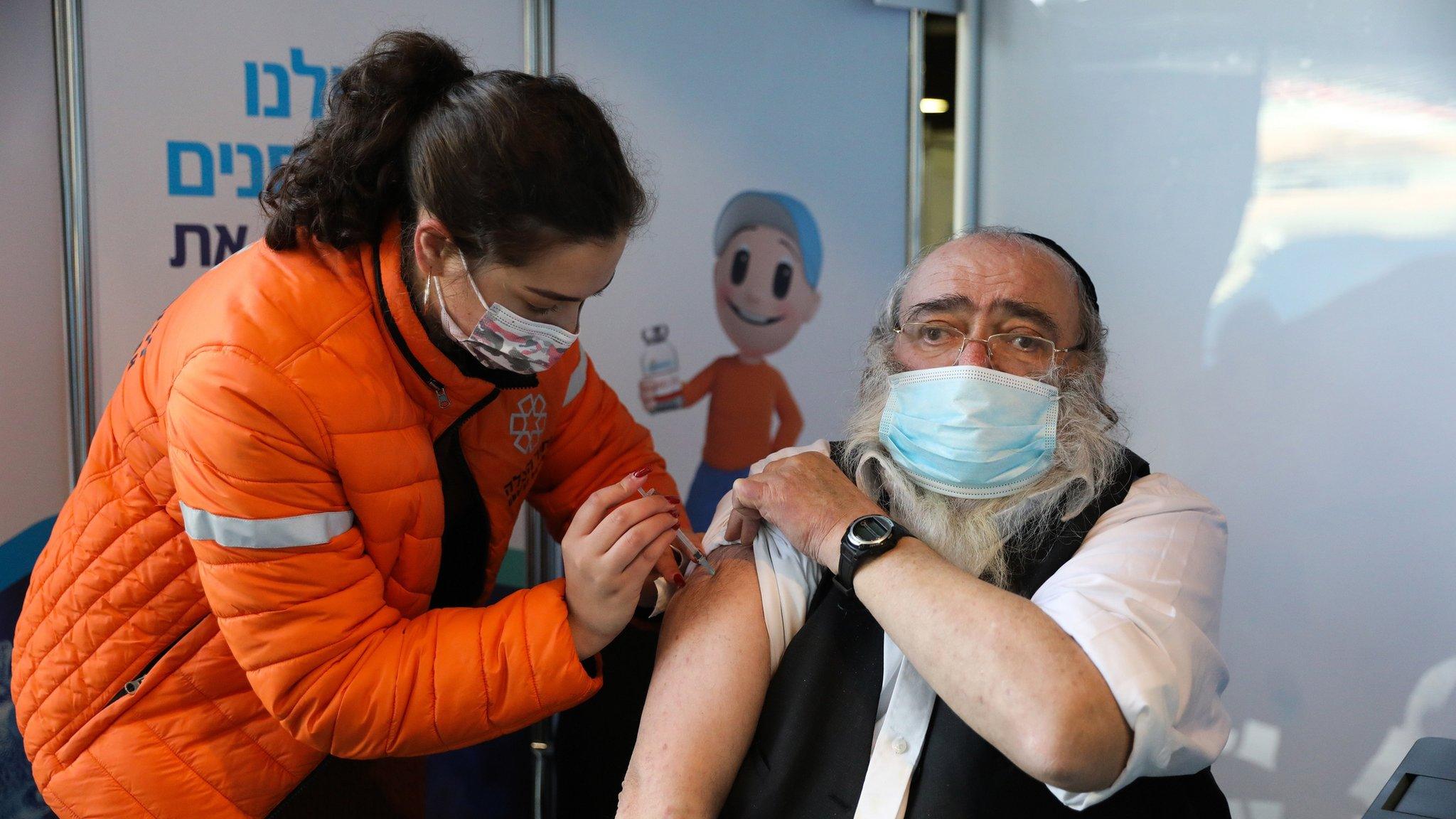Coronavirus: French government vows to speed up vaccinations
- Published

Vaccination at a care home in Dijon
The French government has defended its coronavirus vaccination policy against criticism that it is going far too slowly, with 516 vaccinations reported in the first week.
Government spokesman Gabriel Attal said the delay was down to logistics: teams had to visit elderly people in care homes and get each person's consent.
The EU began vaccinating with Pfizer/BioNTech doses on 27 December.
The EU admits that limited production capacity has created "bottlenecks".
Besides France, there has been sharp criticism in Germany and the Netherlands concerning vaccination delays, as tight lockdown restrictions remain in force, with Covid-19 cases surging.
By Sunday morning about 240,000 had been vaccinated in Germany - far more than in France, but well short of the 1.3 million doses delivered to Germany by the end of December.
Meanwhile, more than a million have been vaccinated in the UK, which approved the Pfizer vaccine in early December.
The Netherlands is the only EU country yet to start its vaccination campaign. The launch had been set for 8 January, but has just been brought forward to Wednesday.
In Italy, by Sunday 118,554 people had been vaccinated, the national broadcaster Rai said.
But the vaccination rates vary from region to region. Densely populated Lombardy, the epicentre of Europe's pandemic last March and still Italy's biggest hotspot, has done 3.8% of its planned 80,595 vaccinations, in the first phase of Italy's campaign.
The figures are higher in some other regions, such as Veneto (40.3%) and Piedmont (31%).
What about the French delays?
Stung by sharp criticism from health professionals, Gabriel Attal said the French vaccinations "will really take off this week and get stronger". From Wednesday "94 medical centres in France will have more than 500,000 doses to give to health professionals".
On Monday France began vaccinating nursing home staff aged 50 and above, as well as the elderly residents.
President Emmanuel Macron is reportedly furious that so few have received the Pfizer/BioNTech vaccine so far. The Journal du Dimanche newspaper quoted him as saying the pace was like a "family stroll", which was "not worthy of the moment nor of the French".
Gabriel Attal explained the roll-out by saying "a more gradual launch is necessary for logistical reasons: you cannot ask these people to go somewhere else in the country, and the delay is also linked to a pre-vaccination consultation and getting consent. This takes a bit more time."
France is among Europe's hardest-hit countries in the pandemic. Its Covid-19 death toll so far is 65,037 - just behind Italy and the UK. French hospitals are treating 24,780 Covid patients, BFMTV reports.


France launched its vaccinations last Monday. The government says it is sticking to a target of a million people vaccinated by the end of January, and it has just over two million doses ready.
The website CovidTracker, external, which collates French official public health data, says that by 1 January 516 people had been vaccinated in France.
CovidTracker estimates that to hit the one million target, nearly 35,000 people would have to be vaccinated daily in France.
Epidemiologist Martin Blachier said "this is the biggest fiasco we've ever had in the medical world. A logistical and communications fiasco." He lamented France's failure to set up vaccination centres of the type now working in Germany.
France's National Academy of Medicine said the government was taking "excessive precautions".
How will the new Pfizer vaccine work?
There is widespread scepticism about the Covid vaccination in France, according to a 15-country poll carried out by Ipsos Global Advisor. It found just 40% of French respondents were willing to have the vaccine, external.
This compares to 80% in China, 77% in the UK, and 69% in the US.
How do EU vaccinations compare with elsewhere?
So far the EU has only authorised the Pfizer/BioNTech vaccine, which presents logistical challenges as it has to be stored at -70C. It is made at a factory in Puurs, Belgium.
The EU was slower than the UK or US to authorise any of the vaccines. The EMA gave its approval for the Pfizer vaccine , externalon 21 December, compared to 2 December in the UK and 11 December in the US.
And on Monday the UK became the first country in the world to start giving people the Oxford-AstraZeneca coronavirus vaccine.
The European Medicines Agency, the drugs regulator for the 27-nation EU, is meeting to consider approving the US-made Moderna vaccine. The German government expects it to get EMA approval on Wednesday, if not earlier.
The European Commission says it has bought access to almost two billion doses of six potential vaccines - for an EU total population of 450 million.
Commission spokesman Stefan De Keersmaecker noted, however, that "one of the main bottlenecks that we are all experiencing now is the production capacity".
And another Commission spokesman, Eric Mamer, said each state - not the Commission - was responsible for its own vaccine roll-out. Each state decides which vaccine to buy, and the quantity, he said.
Earlier, EU Health Commissioner Stella Kyriakides noted that the EU had provided €100m (£90m; $123m) for German firm BioNTech to expand production. BioNTech plans to open a second Covid vaccine plant next month, in Marburg, Germany.
The cost of the purchases is officially secret in the EU, but last month a Belgian official tweeted - and later deleted - vaccine prices, external, according to which the EU is getting the Pfizer/BioNTech vaccine cheaper than the US, at €12 per dose, not €16.

GLOBAL SPREAD: How many worldwide cases are there?
THE R NUMBER: What it means and why it matters
EUROPE'S LOCKDOWNS: Lockdown rules country-by-country

- Published3 January 2021
